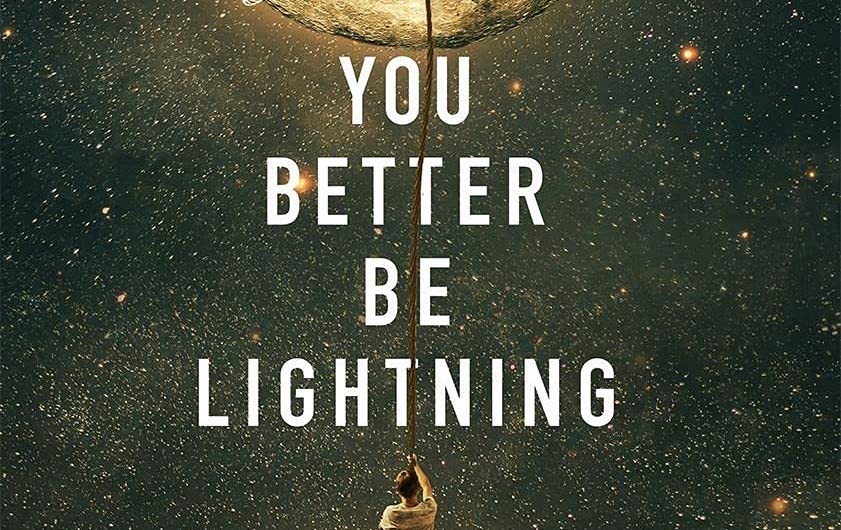
You Better Be Lightning
Andrea Gibson
Button Press Poetry, 2021
Review by Cynthia Sharp
You Better Be Lightning from Button Press Poetry, an independent publisher of performance art, is Andrea Gibson’s eighth overall book in a collection that spans full-length individual poetry compilations, often with writing prompts and interviews, in addition to nonfiction. From the compelling clarity of their words, it’s no surprise that they won the first Women’s World Poetry Slam in 2008, have seven spoken word albums, and have been featured on multiple platforms, including the BBC. What’s most captivating about Gibson’s work is the way it stays fresh, each image a new bud unfurling wings. Even remembered, it arrives with crisp originality—as though we had just walked Mapleton Street with them last week, or felt their electricity vibrate through us in the down-to-earth atmosphere of Denver’s Mercury Cafe.
Balanced within the profound meaning of an honest and committed search to comprehend love—including life-long love of the self—resonant imagery binds the poetry of You Better Be Lightning into memorable emotion. “See This Through,” a poem brimming with hope, combines elements of a list poem laid out across the whole page to allow us to digest each part of the story. With the wisdom to consider that “the beginning might actually be when our hearts have perfect vision,” the optimism of dreamy youth living in the moment cascades over the senses:
I was in a woman’s bed, wrapped up in her sheets,
when she stood naked on top of the mattress and began to peel
the glow-in-the-dark stars off the ceiling, pressing constellations
all over her skin. Cassiopeia on her collarbone. Orion on her wrist.
She said, I could be your universe—and I made my wish.
Gibson’s cosmos refers back to itself, building on themes of stars and reappropriated angels, leaving us with gentle, unforgettable newness. The poet sculpts their youth into vivid, tangible moments, their lived experience connecting with the universal energy of new relationships. In stanzas of two-four lines, figurative language highlights enticing beginnings, when the magic of connection creates space to love almost infinitely before the first hurt. Gibson recounts creative lengths of giving and being in clear pictures we can taste:
Found sixty-four lucky pennies
in the five months after you met,
wrapped them for her birthday in fabric
you cut from the sleeve of your only warm jacket
(“See This Through”)
Drawing on their Baptist background, Gibson ignites the struggles of queer community into a lightning of love in razors and wings, fresh and captivating as they reclaim the spiritual in the human.
The author is fluent in the symbols in which we speak to one another, and their lasting resonance. There are remnants of a Francesca Lia Block-style of fairy tale minimalism, bursting with specific detail, as Gibson takes us for walks through their relationships, memories, and hopes—making their epiphanies tangible for readers. Imagery abounds without overwhelming us, as the narrator finds the courage to look directly at a love—in “The Last Hours” they write: “I finally noticed the gap in her teeth on Mapleton Street, beside a house shaped like a wedding cake.”
Between love poems, a drumming rhythm for justice permeates exquisite depictions enhanced with strong diction—like “who buy stock / in extinction”—in pieces such as “Not Alone” that address our collective responsibility to alter human behaviours and paradigms that contribute to climate change. The proportionality of Gibson’s themes is hard hitting in a connective way, much like their explanation of this collection’s title in the poem “What Love Is.” Gibson was performing for a left leaning queer audience, but also had their partner’s seventy-six-year-old father—who had made a meagre living in a fracking company—in the audience. Gibson pushed themselves to find a truth honest enough to win his understanding: “If you are going to be anything in the world tonight, you better be lighting. Find something in you honest enough to strike them.” They made that strike with examples of his daughter’s everyday acts of love: “How the first time we shared a bed she laid with her arms tight at her side like a mummy, so terrified she was to love something and lose it again.” After the show, “Her father burst through the door, his head nearly axing a hole in the ceiling, tears, like a giant’s tears, covering his face. I’m seventy-six years old, he said, and I just tonight figured out what love is.”
Realism and fairy tales inhabit the landscape of honest emotion Gibson evokes, refined anew on their terms of genuine integrity with “a symphony of walking away from everything that did not want my life to sing” (“How the Worst Day of My Life Became the Best”). There are heavy punches like the one sentence poem “Life Sentence”: “I finally have a wrist that is stronger than the blade.” You Better Be Lightning, however, is also soft enough to draw readers into hopeful places. Gibson has fine-tuned their craft to leave us sated with sparkly disco balls and all the tiny labours of love they give and receive—while compelling the audience to handle the climate emergency with compassion and fairness. As they put it: “love yourself enough to go there.”
Cynthia Sharp holds an MFA in creative writing and an Honours BA in English literature. She’s a full member of the League of Canadian Poets and was the City of Richmond’s 2019 Writer in Residence. Her poetry, fiction and creative nonfiction can be found in many literary journals including CV2, untethered and The Pitkin Review.